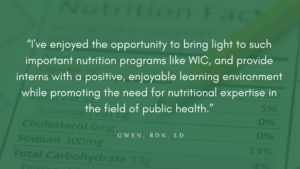Preceptors play a crucial role in shaping the next generation of Registered Dietitian Nutritionists (RDNs). A preceptor is a food and nutrition professional who mentors and trains dietetic interns during their supervised practice hours. Through hands-on teaching, feedback, and real-world experience, preceptors guide interns as they transition from classroom learning into the profession.
Our program recognizes the incredible contributions of dietetic internship preceptors. These professionals generously share their time, expertise, and mentorship to help aspiring dietitians grow and succeed.
As the number of distance and traditional internship programs grows, so does the need for preceptors across all practice settings. Whether you’re working in clinical care, food service, outpatient counseling, corporate wellness, or another setting, there is a growing opportunity to make an impact by mentoring future RDNs.
In this post, we share some of the benefits of being a dietetic internship preceptor, answer common preceptor questions, and include real quotes from Be Well Solutions Dietetic Internship (BWS DI) preceptors about their experiences.
Why Precepting Matters: The Impact on the Profession
Every RDN was once an intern, and every intern needs preceptors who are willing to teach, encourage, and challenge them as they grow. You don’t just help someone check off their supervised practice hours. You help them build confidence, develop critical thinking skills, and find their interests in the field.
The ripple effect of good mentorship goes far beyond the internship. By mentoring dietetic interns, preceptors help shape the next generation of nutrition professionals.
One of our BWS DI preceptors put it perfectly:
“[My favorite part about being a BWS DI preceptor is] the opportunity to give back to the community in which has given me so much. I want to continue to inspire and be inspired by all the incredible people in our field.” – Chris, RDN.
Benefits of Being a Dietetic Internship Preceptor
Professional Growth
Precepting can be a two-way learning experience that helps you stay sharp and inspired. Interns often bring a fresh perspective, new tech skills, recent research, and updated best practices straight from the classroom. It’s not uncommon for preceptors to walk away from the experience with new ideas.
“I love hearing the different ideas and curiosities about our work that the Be Well dietetic interns bring in. They often have such a refreshing energy and fewer preconceived notions about dietetics practice, and I love that. I also appreciate how their questions inspire me to be curious and reflect myself about why we do what we do.” – Lindsay, MA, EdM, RD, CDN.
Plus, precepting qualifies for CPEUs, which can be applied toward your continuing education requirements.

Personal Fulfillment
There’s something special about watching an intern grow into a confident and capable new RDN. Helping someone reach that point is fulfilling in a way that’s hard to describe until you’ve done it.
“[My favorite part about being a BWS DI preceptor is] learning from students! It’s amazing how teaching and mentoring is just as educational for me as it is for the interns. My main values are curiosity and interest, so it really helps center those for me and discover what lights interns up at the same time.” – Jenn, MPH, RDN, LD.
Networking and Career Advancement
Precepting doesn’t just support career advancement for interns. It also expands your network and professional skills. You’ll build meaningful relationships with interns and stay connected with internship program staff, which can open the door to future collaborations and opportunities.
“[My favorite part about being a BWS DI preceptor is] meeting the interns; interacting with the up and coming next generation of RDNs.” – Kimberly, RD, LDN.
It also sharpens your teaching, communication, and leadership skills. These are skills that translate across every area of dietetics and can strengthen your resume no matter where your career takes you.
Support for Your Day-to-Day
Interns are often excited to jump in and help and can contribute meaningfully to your daily workflow.
“[My favorite part about being a BWS DI preceptor is] seeing the excitement of new dietitians entering the field!” – Carrie, MS, RD, CSSD.
They are not just learners but also contributors gearing up to become entry-level RDNs. Interns can assist with projects such as patient education materials, recipe testing, menu analysis, social media content, or research on the latest nutrition topics.
Opportunity to Give Back and Share Your Expertise
You’ve gained a wealth of knowledge through your own experiences, and precepting gives you the chance to pass that on. Many RDNs say precepting helped them rediscover a passion for teaching or mentoring they didn’t know they had.
And ultimately, it’s a meaningful way to give back to the profession. Someone once took the time to train and support you. Now, it’s your chance to pay it forward and help ensure dietetics continues to thrive. With a looming shortage of RDNs, the profession can’t grow without dedicated preceptors. Your involvement directly shapes the next generation and helps ensure we have enough qualified professionals to meet the growing demand.
“[My favorite part about being a BWS DI preceptor] is the ability to pay it forward and inform in an area not typically covered in depth during coursework.” – Carly, MS, RD, LDN.

Build a Pipeline of Future Employees
Hosting a dietetic intern can also be a strategic opportunity to evaluate potential future team members. You’ll have an opportunity to see their clinical skills, communication style, and professionalism in action. Many sites find that precepting leads to seamless hires, with interns receiving job offers after completing their supervised practice. It’s a low-risk way to invest in talent and grow your team with confidence.
Addressing Common Preceptor Questions and Concerns
Do I have time to be a preceptor?
We know your time is valuable, and precepting is a commitment. That’s why we do everything we can to make the process as smooth and flexible as possible. From paperwork to competency questions, our team is here to support you every step of the way.
You’re never obligated to take on more than you’re comfortable with. There’s no minimum number of interns required. You can host one intern for a single rotation or several over time. We also offer both full-time and part-time program tracks so that scheduling can work around your availability.
With the right supervision and guidance, interns can contribute meaningfully to your daily workload by assisting with patient education, research, menu planning, content creation, and more. Our goal is to create a win-win experience for both you and the intern.
What if I’ve never been a preceptor before?
That’s okay! We’ve worked with many new preceptors. You’ll receive a preceptor handbook for your specific rotation, complete with examples of tasks that meet each competency. Our team is here to guide you through the process and answer questions along the way.
ACEND also offers a free online training course for preceptors that awards 8 CPEUs. While it’s a great resource, it’s not required.
What are the preceptor’s paperwork and administrative responsibilities?
We strive to keep paperwork and administrative responsibilities straightforward. Before the rotation begins, new preceptors receive two forms: an affiliation agreement and a preceptor guide. If your facility has its own paperwork or onboarding process, we’re also happy to work with that.
After the rotation, you’ll review and sign off on intern time tracking and complete competency and professionalism evaluations. Forms are submitted through the online platform PRISM.
What support will I get from the BWS DI program?
Every BWS DI intern has an assigned faculty advisor who’s available to answer questions, address any concerns, and provide support throughout the rotation. Our program also has a dedicated administrative assistant here to help coordinate the initial paperwork process mentioned above.
“Thank you for this opportunity! The support and connection you provide for your interns is so inspiring! Xx.” – Jenn, MPH, RDN, LD
What competencies need to be met during the rotation?
Competencies vary depending on the type of rotation: clinical, community, foodservice, or wellness. A preceptor handbook with the list of competencies for the specific rotation will be available to every preceptor. If you’d like a copy to review now, please send us an email at bwsdi@bewellsolutions.com. For elective rotations, targeted CDRNs are chosen by the intern and preceptor.
Can I precept if I work part-time?
Yes! Since we offer both full-time and part-time tracks, we can match you with an intern whose schedule aligns with yours.
Do I need to precept a certain number of interns each year?
No, there is no minimum. When we have an intern in your area who could be a good fit, we’ll reach out to see if you’re available.
Is there a minimum number of years I need to be an RDN before I can precept?
We will always consider the individual scenario, but we recommend that RDNs have at least 2 years of experience before becoming a preceptor. We’ve found this time allows new RDNs time to get their footing in the field and settle into their job.
What’s the Next Step: How Can I Become a Preceptor?
Are you ready to learn more about becoming a preceptor with Be Well Solutions Dietetic Internship? Whether you’re ready to host an intern now or simply curious, we’d be happy to connect and answer any questions you have
Visit the Become a Preceptor page on the BWS DI website to take the next step.
You’ll find
- A brief overview of preceptor requirements
- A short interest form
We’re excited to work with you!
Precepting Creates a Lasting and Meaningful Impact
Preceptors are essential to the future of our field. Your mentorship helps shape thoughtful, skilled dietitians who will help carry the profession forward alongside you.
If you’ve ever thought about becoming a preceptor or if you’re a seasoned mentor ready to take on another intern, we invite you to join us in shaping the future of dietetics.
Finally, to all our current and future preceptors, thank you. Your guidance means more than you know.

